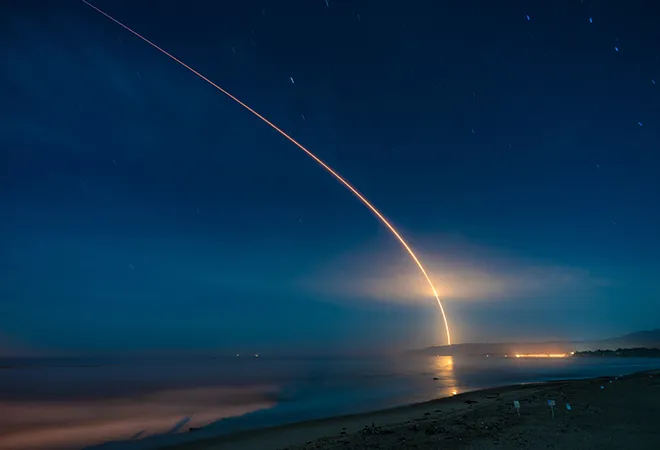Billionaire entrepreneurs are now leading space exploration, including the quest for expanding humanity’s footprint in outer space. Barely weeks after billionaire Elon Musk stunned the world with images of Starman cruising in outer space in a red Tesla Roadster, his counterpart, Jeff Bezos, launched the Mannequin Skywalker to experience weightlessness in space. Both of them now say they expect to replace these lifeless dummies with real people.
There is no doubt about Musk and Bezos’s passion for exploring space, but the question must be asked — will their intervention actually help? The answer is yes. Though the duo may differ in their respective goals for taking to human spaceflight, they share the motivation and willingness to take risks associated with these ventures. In the process, they have rejuvenated the case for reusable launch vehicles, bringing down the cost of access to space.
Space exploration began with the Cold War with the US and the Soviet Union racing to reach further destinations in space. Musk and Bezos’s generation was influenced by the ‘Apollo moment’, thinking that landing on Mars was around the corner. However, the scaling back of human space exploration after the Apollo project disappointed everyone. The follow-on space shuttle project has not yielded the expected cost benefits of reusable launch vehicles and an end date for the International Space Station (ISS) has often been discussed. Although the space generation has found jobs in aerospace and allied industries during these years, human exploration of distant worlds and the individual dream of flying into space remained unfulfilled.
Elon Musk rejuvenated these dreams by talking about ‘colonising’ Mars in order to make humanity a multi-planetary species. He perceives the launch vehicles, which are usually discarded after a single use, as reusable (multiple times). His company SpaceX has successfully demonstrated this concept by launching the Falcon 9 rocket multiple times. The satellite operators are eager to fly on these launchers to take advantage of the lower launch costs. In addition to commercial satellite operators, NASA and the US Air Force (which manages US military space segment) have now become customers of SpaceX.
Musk is not alone. Jeff Bezos is also experimenting with reusable launch vehicles. However, Bezos differs from Musk as he aims to make the Earth sustainable for future generations, by shifting heavy manufacturing into space. As Blue Origin evolves, it finds different customers. The recent test of the New Shepherd (named after the first American in space) is to enable space tourism, where participants can experience weightlessness even as they try to comprehend the grandeur of our planet. The ‘Overview Effect’ during spaceflight is a cognitive shift in awareness of life and the planet as astronauts orbit Earth high above. Blue Origin intends to make that experience possible for all.
The reusability has landed international commercial satellite contracts for Blue Origin. Bezos is also thinking of establishing the ‘skeleton of services’, which new commercial lunar explorers can take advantage of, much like how Amazon took advantage of existing infrastructure — such as the internet and postal service for its growth. The perspective on the Moon has shifted to a depository of valuable minerals and metals that can be extracted for in-space manufacturing. A range of government and private actors are now designing missions for this purpose and Bezos would like to enable these missions using the Blue Origin infrastructure, which will in turn help him achieve his own goal of making the planet sustainable. He is investing by selling about $1 billion worth of Amazon shares every year.
Musk and Bezos are not alone. More billionaires such as Richard Branson from the UK, Yuri Milner from Russia are joining their American counterparts Bill Gates and Paul Allen in investing in space ventures. Giant tech companies like Facebook and Google have also demonstrated their interest. It might be amusing to watch Musk and Bezos take to Twitter, spatting over their successes and who’s first. However, Bezos says the competition should not be about determining the future monopoly on the commercial launch business, but about creating an ecosystem for other entrepreneurs to thrive upon.
The identity of the new space age is the entrepreneurial ability to take risks and determination to ‘shake up’ the prevalent culture for building a better future. Legendary flight director Gene Kranz praises Musk for reigniting such spirit in the space industry, the same spirit that guided NASA in the 1960s and 1970s that made Apollo a reality. Kranz admits that NASA has now succumbed to a large bureaucracy and cultural requirements that retards it.
A new space age is becoming possible, with the help of billionaire entrepreneurs in their quest to make space exploration exciting and goal oriented. They are determined to invest in their space companies even at the expense of their other companies. The motive is not so much about making profits, but the recognition and legacy of providing basic infrastructure to other space entrepreneurs.
This commentary originally appeared in DNA.
The views expressed above belong to the author(s). ORF research and analyses now available on Telegram! Click here to access our curated content — blogs, longforms and interviews.




 PREV
PREV


